
Are you interested in getting your firm to the #1 position in Google’s search results?
Of course you are. Who isn’t?
SEO for lawyers remains one of the most effective ways for law firms to attract quality clients.
You don’t have to be a digital marketing expert to implement a law firm SEO strategy. Our guide is carefully crafted for beginners, giving you the information you need to know to get to the top of Google (without the fluff).
It’s broken down into digestible chapters for easy reading. If you’re more interested in a specific area of SEO, just head on over to that chapter by clicking one of the links below.
Let’s begin.
Law firm Search Engine Optimization (SEO) strategically enhances a law firm’s online presence, aiming to boost organic website traffic without paid ads. It involves keyword optimization, quality content creation, and technical SEO to improve visibility and attract potential clients from search engines effectively.
As a marketing tactic, SEO for lawyers requires in-depth keyword research, onsite optimization, link building, citation building, Google Business Profile optimization, content marketing, and analytics configuration.
All of those items feed into one thing — making your law firm’s website the most relevant and high-quality resource for your practice area. The more boxes you check, the more likely you’ll meet Google’s criteria.
Here’s a quote from Google on the purpose of its search engine.
Search engines exist to help people find what they are looking for. To do that, search engines must provide a diverse set of helpful, high-quality search results presented in the most helpful order.
Google also prioritizes ranking helpful content. The algorithm prioritizes content that satisfies visitors fully. If a visitor leaves your page and heads to another page on the SERP, it sends a signal to Google that your content isn’t helpful
Content that doesn’t meet visitor’s expectations won’t perform as well.
When done right, SEO outperforms other channels prospective clients use to find a lawyer, including social media and word-of-mouth.
We tell all of our clients that SEO is a long-term investment. It’s the only channel that nets you compounding returns over time. It might start slow, but you’ll experience steady growth.
When looking for a new service in your area, most people don’t think about things like YellowPages. They head straight to a search engine.
In fact, one study found that up to 85% of people looking for legal advice go to a search engine.
That won’t come as a surprise to most people. The majority of people use Google to answer questions and queries, research products and services, and even rely on it for legal and medical advice.
If the goal is to become more visible online and attract prospective clients to your website, you need to focus on SEO.
The potential for growth is like no other marketing channel. Google processes 8.5 billion searches a day.
When we look at our clients’ websites, we see that, on average, 80%+ of all traffic comes from organic searches.
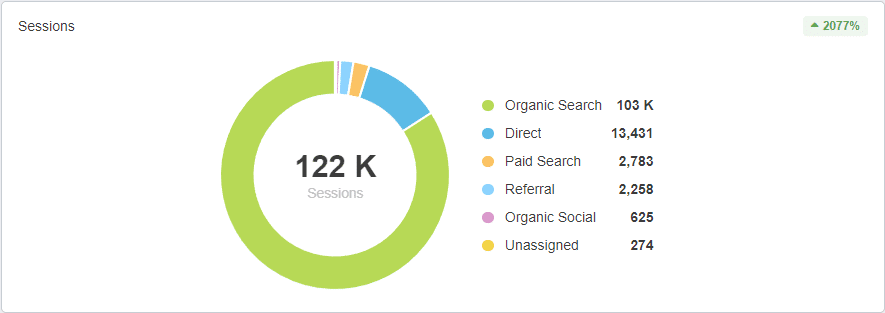
You know you want to be present on Google. But it’s not enough to sit on the second page.
Only 0.63% of Google searchers will click a link on the second page, while the #1 result in Google’s organic search has an average CTR of 27.6%.
Your placement on Google’s SERP (search engine result page) affects how many visitors you get to your law firm’s website. The more website visitors you get, the more paying clients you get.
Seeing as most people only hire one lawyer, placing higher on the SERP is even more crucial for law firms
How high?
As high as you can go. Settling for the bottom of the first page won’t get you the results you expect. The #1 result in Google’s organic search is 10x more likely to get a click than the tenth result.
The top 3 results get 54.4% of all clicks, with the majority going to the #1 spot.
Out of all the marketing channels out there, law firm SEO costs the least and produces the highest return on investment. And it’s showing no signs of slowing down.
But it will only get more important as time goes on to rank highly on the SERP.
If your law firm’s website can’t be found on search engines, you’ll have to rely solely on referrals. While word-of-mouth is powerful, SEO is much more sustainable and is in your control.
While Google’s algorithms are always changing, the primary ranking factors stay pretty consistent over time.
These five ranking factors are the cornerstone of any successful SEO strategy. A focus on these five is often enough to get you to the top of Google, regardless of your practice area.
The cornerstone of any effective SEO strategy is the creation of engaging, informative content.
This includes everything from detailed practice area pages and insightful blog posts to compelling images and videos. It’s how you communicate your law firm’s value to potential clients.
Below, we’ll discuss how to create helpful content that your visitors (and Google) will love.
Your website should serve as a comprehensive resource that addresses the specific queries and keyword searches of your target audience.
Understand the search terms related to your area of law. For example, if you’re a criminal defense lawyer in Austin, Texas, you need to put yourself in your client’s shoes.
You need to consider…
I’m sure you’re familiar with the concept of keywords in the SEO world. However, it’s not enough to simply stuff keywords into your content.
Optimization goes beyond that and considers user intent when evaluating your content (plus other factors like relevancy, user engagement, etc.)
To optimize your content, include your main and secondary keywords in your titles, headings, and throughout your content. But also think about the user experience and the intent behind the search query.
For example, someone searching for “DWI in Austin” could be looking to learn about DUI laws in Austin or may be searching for a lawyer. It’s up to you to determine the intent behind the keyword.
Google aims to understand the searcher’s intent (or user intent, as we just discussed) and deliver the most relevant and helpful content.
Analyzing the top-ranking content for your target keywords can offer insights into what Google considers most relevant for those queries. Pay attention to HTML elements like title tags and header tags (H1, H2, H3) to structure your content effectively and match the expected search intent.
Backlinks occur when external websites link to your content, directing their audience to your site. These links are Google’s way of gauging the credibility of your content.
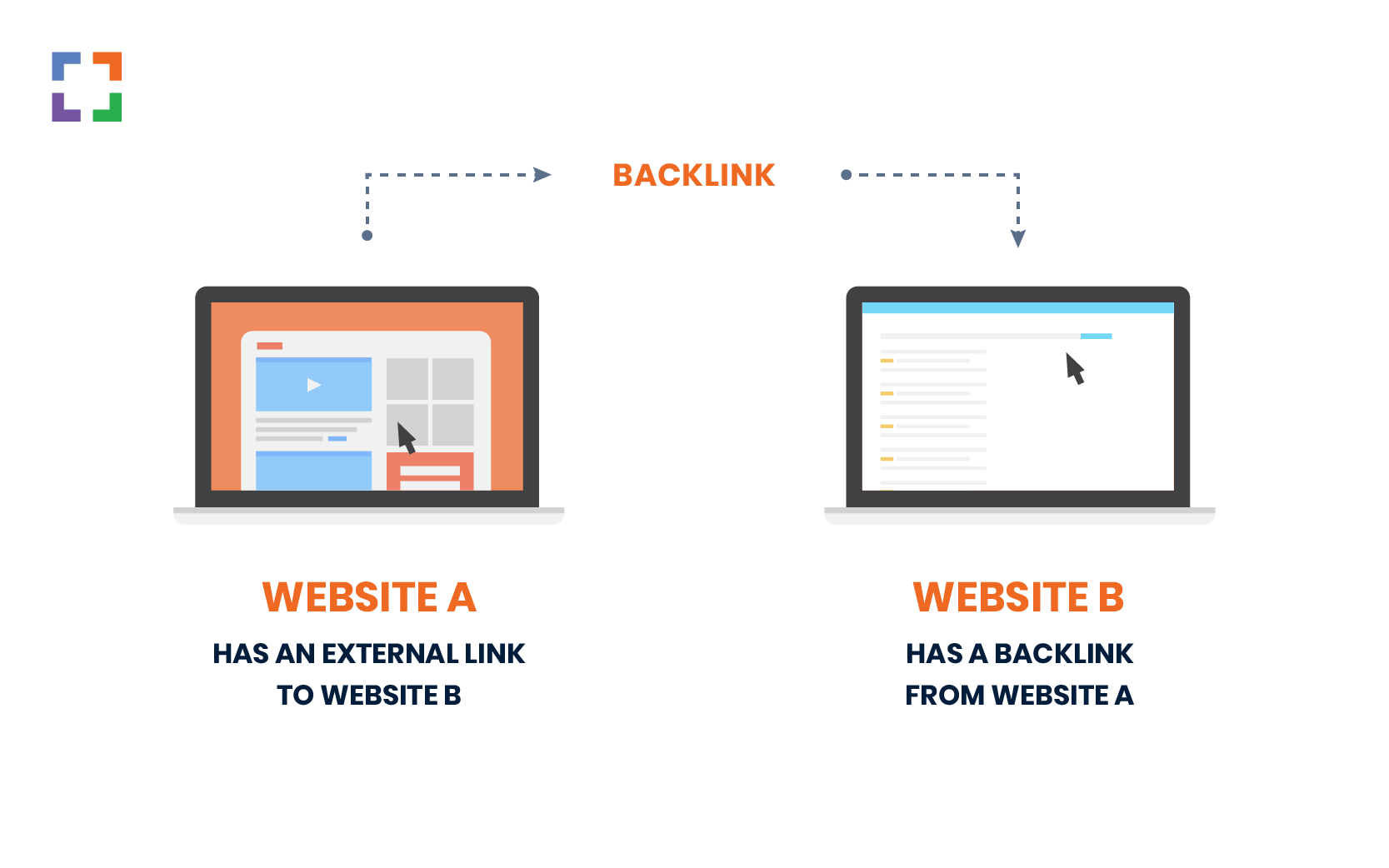
Essentially, each backlink is an endorsement of your site’s credibility and authority.
As the number of high-quality backlinks increases, so does the perceived trustworthiness and authority of your content. But not all backlinks are created equal.
Several factors determine a backlink’s quality:
Google may perceive websites lacking high-quality backlinks as less credible or authoritative.
Technical SEO, simply put, is more concerned with making your website appealing to search engines and crawlers. When built correctly, your website will be easy to crawl and index, and the content will be easy to understand, helping Google know what it is and where to rank it.
At its most basic level, technical SEO involves using:
A final word on website structure: A flat structure is better for SEO, as it keeps your pages only a few links away from each other in the hierarchy. It improves crawl ability and usability.
Check out Google’s SEO guidelines for more ways to improve your site structure.
Google also cares about the experience you provide to users. While not as important as a ranking factor, the way users behave on your website sends either positive or negative signals to Google.
If a user leaves your website right away, that signals a poor user experience and tells Google your content is not helpful.
Overall, UX is about how visually appealing your website is, how easy your website is to navigate, and how your website performs compared to competitors.
Luckily, you don’t need to guess at the specifics of what Google looks at.

“My website continues to dominate all the top website searches in my industry and my business has grown 10-fold as a result.”
Oykhman Criminal Defence
When one of your prospects searches “DWI lawyer near me,” Google shows firms in Maps and organic search close to the user’s geographical location.
This is prime real estate, as these searchers are likely to convert.
Fill out your Google Business Profile with accurate information, as it’s the main source of information pertaining to local SEO.
Google looks at a few ranking factors to rank local businesses:
SEO is one of the only marketing strategies that offers compounding returns. Whereas channels like PPC, while great at driving immediate leads to your website, offer temporary gains.
The catch with PPC is that the moment you stop pumping in money, your hard-earned online presence and traffic decrease. It’s as if you haven’t marketed at all.
SEO is the exact opposite. Over time, your traffic multiplies, and you continuously build on the gains you worked so hard for.
As mentioned, most clicks go to the top three results on Google (with most going to position 1). If you’re not in the top three, you’re missing out on tons of potential leads.
Our clients get tens of thousands of monthly visitors from the SEO work we do. If they went the PPC route, this particular client would be paying over $75,000 per month for the same performance.

To start, you first need to decide whether you want to:
There’s no wrong answer here. However, SEO is hard work requiring consistent effort. It’s not enough to focus on SEO for a week and set it aside.
If you do decide to DIY your SEO, here’s how you can get started.
Documenting and planning your law firm’s search engine optimization strategy is crucial.
It’s about more than just choosing keywords or publishing content sporadically; it involves a comprehensive approach that involves content creation, link building, and technical optimization.
You need to invest in these three pillars of law firm SEO. We recommend running a site audit on Semrush or similar tools to get an idea of where you stand.
Optimizing your Google Business Profile (GBP) is one of the first steps in law firm SEO that can significantly enhance your law firm’s visibility in local search results.
Your Google Business Profile (formerly Google My Business) is the hub of your local SEO. It provides potential clients with essential information, like your location, services that you offer, operating hours, and client reviews.
To maximize its impact, ensure your profile is complete, accurate, and up-to-date. Regularly updating your profile with fresh photos, responding to reviews (both positive and negative), and posting updates about your firm can improve your engagement with potential clients.
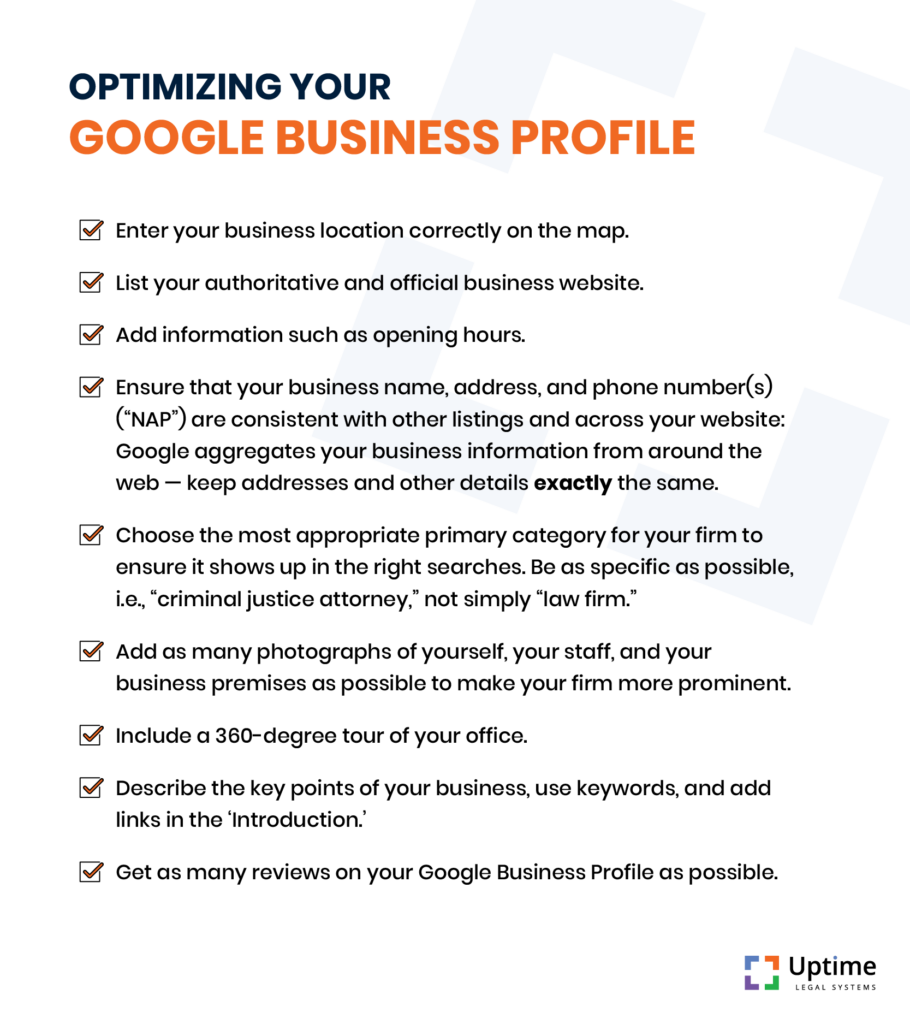
For your SEO efforts, the significance of a well-designed website cannot be overstated.
Google presents its users with high-quality content in a format that’s not only accessible but also engaging and user-friendly.
Your website should provide a great user experience, encouraging visitors to spend more time on your site and interact with your content. This interaction is a positive signal to search engines, contributing to higher rankings.
With the shift to a mobile-first index, it’s even more important to ensure a seamless user experience across all devices. Your website should be responsive and provide the same high-quality experience across all devices.
Take a look at the website we created for our client, Noland Law Firm for inspiration.
Americans average around seven hours a day online, and during this time, your website should be actively working to attract and convert prospective clients.
It acts as your round-the-clock salesperson, drawing specific audiences, delivering the information they seek, and guiding them through the buyer’s journey toward choosing your services.
Without a functioning website, you risk missing out on the opportunity to expand your client base beyond traditional networking and referrals.
Your website should be a dynamic resource that aids potential clients as they navigate through the stages of the buyer’s journey:
A strategically designed website facilitates this journey, incorporating content tailored to each stage. No matter where your prospect is, there should be content ready for them.
Keyword research is critical for optimizing your law firm’s website.
As you know, it involves identifying phrases your target audience uses when searching for legal services online.
This step ensures your content, from practice area pages to blog posts, aligns with what potential clients are actively seeking.
Tools like Semrush are invaluable for discovering these keywords. They allow you to input initial keyword ideas and explore variations that relate to your practice area.
The goal is to focus on keywords that you have a realistic chance of ranking for. Avoid highly competitive keywords dominated by authoritative sites.
Instead, target specific, relevant phrases that match your firm’s offerings and have lower competition, increasing your visibility and attracting more qualified traffic to your site.
Geographically specific keywords should be your bread and butter. Targeting keywords like “family lawyer in Chicago” is more effective than going after “family lawyer,” for example.
After identifying the search terms relevant to your law firm’s SEO strategy, the next step is to produce content that aligns with what users are looking for.
Examine the content types that dominate the first page of search results for your chosen keywords. Whether it’s listicles, in-depth “how-to” guides, or service-oriented landing pages, these formats offer valuable insights into user preferences and search intent.
For instance, if the search term “hire accident lawyer” primarily returns educational articles on the process and timing of hiring an accident lawyer, it suggests that creating a detailed blog post on this topic could effectively capture this search intent.
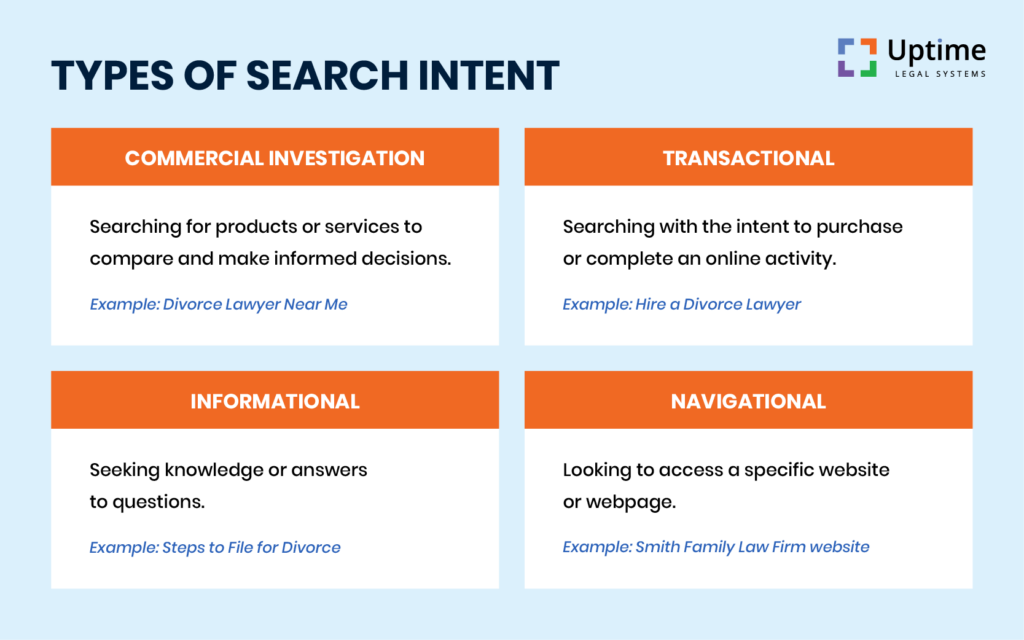
Another part of optimizing your content is looking at on-page elements. This includes refining meta descriptions, title tags, and headings (H1, H2, H3) to ensure they’re not only search engine friendly but also enhance user engagement.
Proper article formatting, such as using short paragraphs and bullet points, improves readability and user experience on your site.
Link building is a crucial component of SEO for law firms, acting as a key signal to search engines about the credibility and authority of your website.
But link building in itself is hard work. It involves manually reaching out to other websites to encourage them to link to your content.
But effective link-building can significantly enhance your site’s visibility, drive more organic traffic, and improve your overall online reputation.
A robust backlink profile focuses both on the quality and quantity of backlinks. Simply put, a website with many high-quality backlinks is thought of as more authoritative than one without.
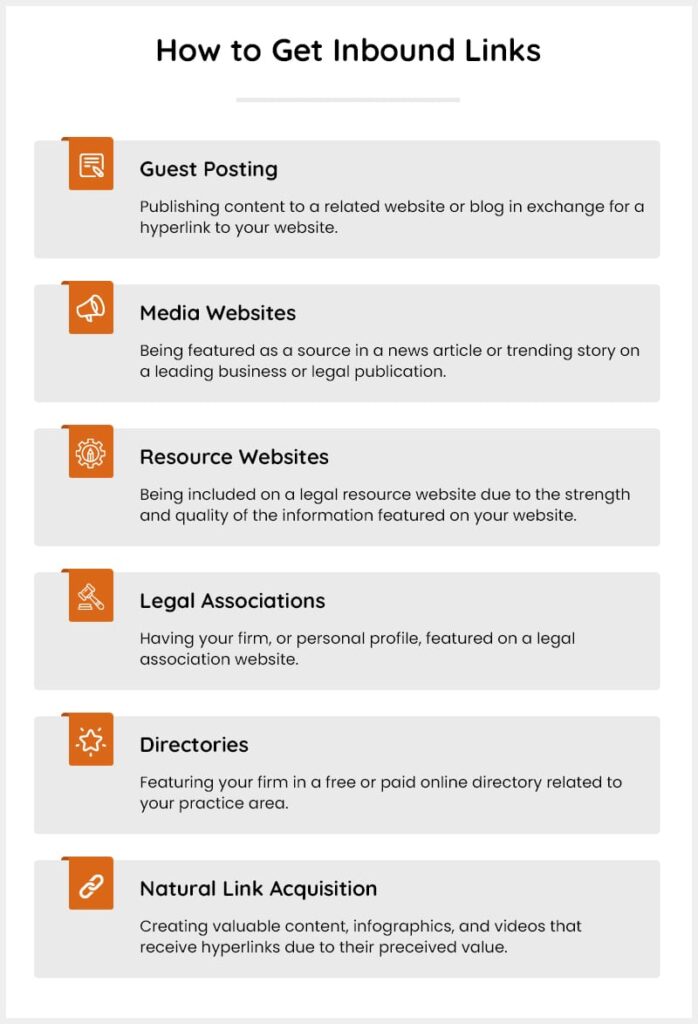
To start, get your law firm listed on reputable legal directories like:
The second lowest-hanging fruit is unlinked brand mentions.
For example, if a news outlet mentions your law firm in an article, simply reach out to the author and request they link to your website.
We cover more techniques and link-building strategies in the link-building section of our guide.
The recent update to Google’s content quality guidelines has introduced an additional emphasis on Experience, transforming the E-A-T (Expertise, Authoritativeness, Trustworthiness) principle into E-E-A-T.
Given the high stakes associated with legal advice and services, which fall under Google’s Your Money or Your Life (YMYL) categories, the quality and reliability of information provided can significantly impact individuals’ lives.
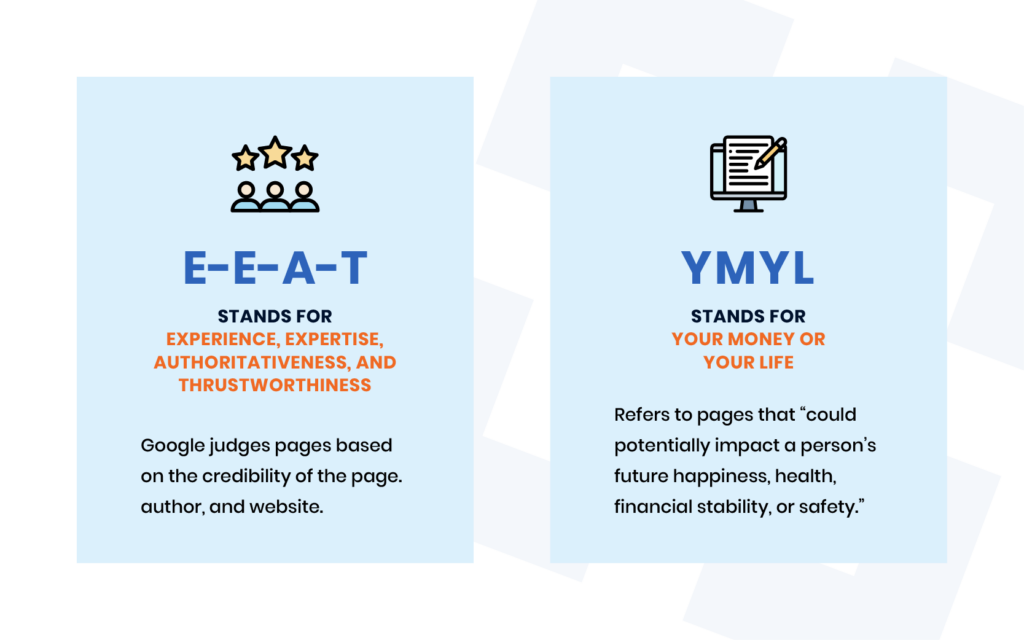
For law firms, this means it’s even more important to showcase the depth of your experience and expertise throughout your website.
Here’s a breakdown of what E-E-A-T stands for:
SEO for lawyers was, still is, and will be (for the foreseeable future) a key foundation of any law firm’s marketing strategy.
If you’ve read this far, congratulations! You now know most of what you need for a comprehensive understanding of SEO basics.
In brief, try to focus on:
If you’re looking for law firm SEO services, reach out for a free consultation.
Ready to maximize your marketing budget? Fill out the contact form or call us today for a complimentary consultation. We will listen to your story, work to define your business objectives, and recommend an approach to deliver maximum ROI for your firm.
7500 Flying Cloud Drive
Suite 625
Eden Prairie, MN 55344
10900 Stonelake Boulevard
Building 2, Suite 100
Austin, TX 78759
2005 Sheppard Ave E
Suite 402
Toronto, ON M2J 5B4
By using this website, you consent to our use of cookies in accordance with our Cookie Policy. Cookies help us enhance your browsing experience and provide personalized content. If you do not agree to our use of cookies, please adjust your browser settings accordingly.